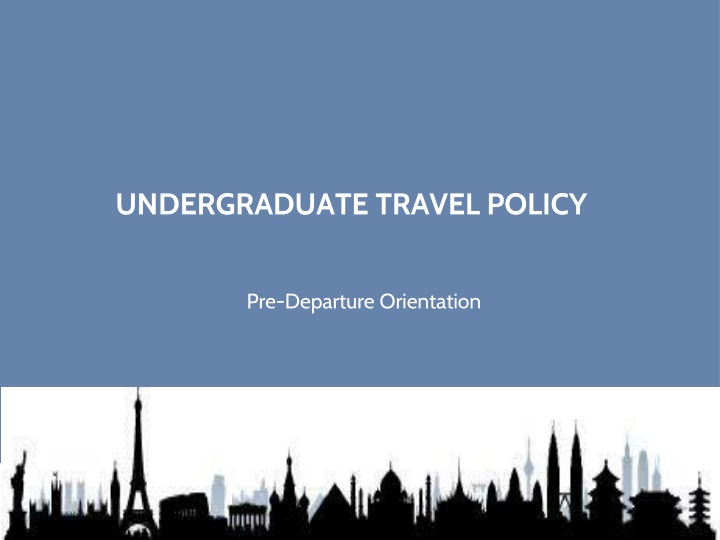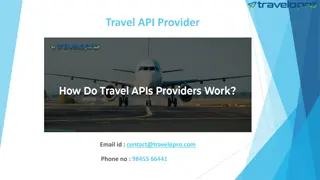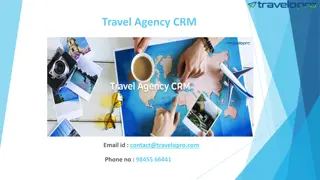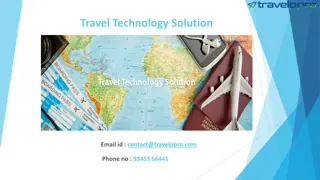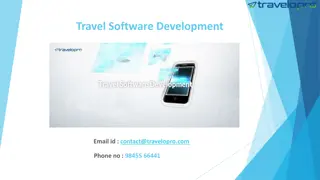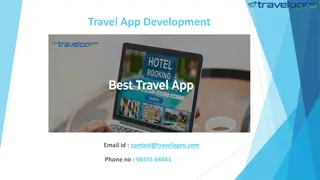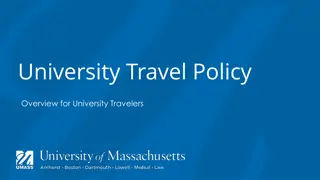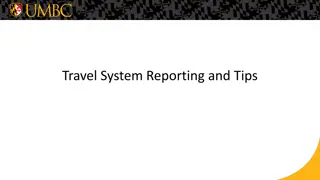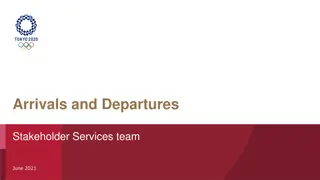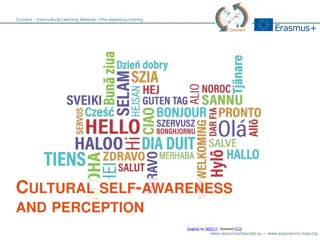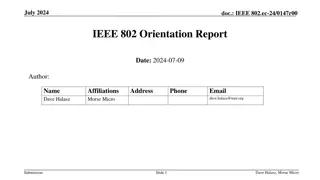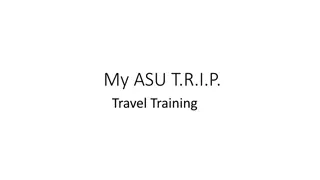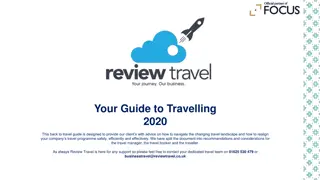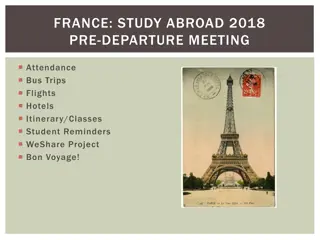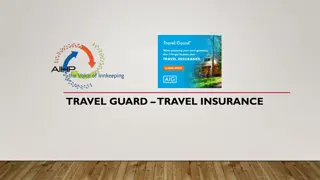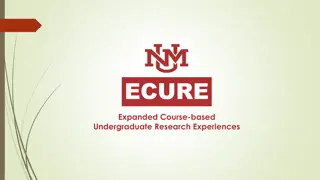Undergraduate Travel Policy Pre-Departure Orientation Overview
This pre-departure orientation guide for undergraduate students provides essential information such as completing required forms, registering side trips, maintaining health insurance, and following safety protocols. The guide ensures well-prepared and well-informed travelers for global adventures. Detailed steps and options for side trip registration through the ISOS Assistance App are also outlined.
Download Presentation

Please find below an Image/Link to download the presentation.
The content on the website is provided AS IS for your information and personal use only. It may not be sold, licensed, or shared on other websites without obtaining consent from the author.If you encounter any issues during the download, it is possible that the publisher has removed the file from their server.
You are allowed to download the files provided on this website for personal or commercial use, subject to the condition that they are used lawfully. All files are the property of their respective owners.
The content on the website is provided AS IS for your information and personal use only. It may not be sold, licensed, or shared on other websites without obtaining consent from the author.
E N D
Presentation Transcript
UNDERGRADUATE TRAVEL POLICY Pre-Departure Orientation
Click Here to Begin Pre-Departure Orientation As you prepare to embark on a new global adventure, CITY we want to start by congratulating you! At Columbia, College Walk extends around the world and we are excited for your next steps. This pre-departure orientation will help you to be a well-prepared and well-informed traveler, both as you prepare to go abroad and throughout your travels.
UNDERGRADUATE TRAVEL POLICY OVERVIEW
Ive got School Sponsorship, now what? At least two weeks before departure 1. Complete this Pre-Departure Orientation 2. Complete and sign a Risk Waiver and Release Form, available in the Undergraduate Travel Web App. 3. Register all travel with the University s international travel assistance services, International SOS (ISOS). While traveling abroad 1. Maintain a health insurance policy that will also provide coverage outside the U.S. for routine, urgent, and emergent care. 2. Update your School Sponsorship application with any side trips taking place during your program, as well as seven days before or after the start or end of your program. You can makes these updates in the Undergraduate Travel Web App. If you are traveling to a high or extreme risk location 1. Complete any additional required safety protocols, as shown in the Undergraduate Travel Web App.
Side Trips Side trips are defined as any travel destinations that are not an official part of your Columbia-Led, Columbia-Facilitated and/or Recognized Travel program s curriculum or itinerary that occur during the dates of your program or within seven days prior to or after the completion of your program. Sides trips include personal travel that takes you out of your main program location, including a different city or country. Side trips might be planned far in advance, or might be initiated spontaneously. If you know your side trip details prior to departure, update your School Sponsorship application to register your side trip. If you decide to take a side trip after you are in your destination country, use the ISOS Assistance App to check-in to your side trip destination once you arrive.
Registering Side Trips There are 3 different options to register your side trips ISOS Assistance App We strongly recommend that you download the ISOS Assistance App to easily register a side trip while on the go. https://www.internationalsos.com/~/media/corporate/files/images/app-badges/windows.png?h=44w=133la=en https://www.internationalsos.com/~/media/corporate/files/images/app-badges/google.png?h=42w=134la=en https://www.internationalsos.com/~/media/corporate/files/images/app-badges/apple.png?h=41w=133la=en ISOS MyTrips Undergraduate Travel Web App
What if I dont comply? Students who do not comply with the Undergraduate International Travel Policy will be referred to Student Conduct and Community Standards for a Dean's Discipline hearing to discuss the incident. Additionally, they may risk having their sponsorship and/or program funding revoked or their program terminated. This policy does not replace any additional requirements as required by a student's home school. Barnard College, Columbia graduate, and visiting students are encouraged to check in with their home school prior to finalizing any travel arrangements for additional directives. The Undergraduate Travel Review Committee, composed of representatives from the University and Deans Offices of the undergraduate schools, is responsible for decisions about School Sponsorship and for updates about safety protocol.
PREPARING TO GO ABROAD How to prepare, who to call, and what to do
INTERNATIONAL SOS ISOS provides 24/7/365 support to students traveling abroad. ISOS can assist with urgent medical care, security and logistical concerns, and emergency evacuations. Keep the ISOS contact phone number and membership number handy at all times: Dedicated Telephone: +1-215-942-8478 Membership number: 11BSGC000064 Credit: Pete Bridge https://www.internationalsos.com/~/media/corporate/files/images/app-badges/windows.png?h=44w=133la=en https://www.internationalsos.com/~/media/corporate/files/images/app-badges/google.png?h=42w=134la=en https://www.internationalsos.com/~/media/corporate/files/images/app-badges/apple.png?h=41w=133la=en
INTERNATIONAL SOS How can ISOS help you plan for your travel? Recommendations for reputable and safe lodging prior and during your trip. Targeted, up-to-date region/city-specific email alerts sent to you. Be sure to opt in to email alerts when you register. Updated global risk ratings by country. Emergency evacuation support should there be an uprising, natural disaster or health outbreak. Pre-trip travel guides including in-depth information for your specific destination. Help finding reputable global health clinics should you require urgent medical treatment. Assistance if you lose your passport or other travel documentation. Tracking solutions and mobile apps to keep you connected and ease communication while abroad. PLEASE NOTE ISOS does not provide health insurance. It is your responsibility to ensure health care coverage prior to departure.
ISOS How to register on ISOS before you travel 4 Once your profile is complete, click Update . Visit the International SOS site and click on the MyTrips link on the upper right side below the membership card. 1 Click on Create New Trip "and Enter your trip details including outbound flight (to your program), inbound flight (from your program), and accommodation details. 5 Click on New User to create a profile. 2 Create a separate itinerary for each additional side trip (including personal trips). 6 After entering your basic profile information, make sure you select the correct School Affiliation . Contact your Columbia program manager to confirm your school affiliation. 3 7 Opt in to email alerts. Please Note: You will be able to print the links to key resources, including those mentioned here, at the end of this orientation
ISOS When should I contact ISOS? Before You Leave Pre-trip questions about medical care, security and general travel advice. While Abroad Lost prescription medication. While hospitalized, should you require local assistance or translation.* To better understand the security implications of a recent event and the necessary safety measures. To get assistance during a security crisis. To get assistance, evacuate or be marked safe for family and your home institution during a natural disaster. For help after the loss of your ID/passport/travel documents. Enhanced Emotional Support Services, including access to counseling sessions via the ISOS Dedicated Line (+1 215-942-8478) *Additional fees my be incurred for translation services.
EMERGENCIES WHILE ABROAD How to prepare, who to call, and what to do
EMERGENCIES HOW TO PREPARE Review information, alerts, warnings, and other guidance issued by the U.S. Department of State, ISOS, health authorities, and other governmental and non-governmental entities. Register with ISOS to receive alerts, advisories and warnings for the region you will be traveling in. Know the ISOS phone number and Columbia s membership number, and save them in your phone. Have the phone number of an administrator from your program with you at all times. Review your destination country s emergency numbers and save them in your phone. Monitor Department of State alerts in advance of your trip and throughout your time abroad. ISOS Phone Number: +1-215-942-8478 ISOS Membership Number: 11BSGC000064
EMERGENCIES IN CASE OF AN EMERGENCY Don t panic. Let an administrator from your program and your family know that you are safe. Follow any additional emergency protocols prescribed by your in-country program coordinator and/or local institution. If you have a life-threatening emergency and need immediate assistance, call 911 or its equivalent in the country where you are located. If there is an urgent, but non-life-threatening situation, monitor the situation and reach out to ISOS with any questions or concerns. Should you receive communications from ISOS, the University or a program contact, respond immediately to confirm your safety, even if you ve already let someone else know.
EMERGENCIES Natural Disasters, Political Uprisings, and Urgent Medical Care ISOS offers 24/7 worldwide medical referrals, medical and security assistance, lost passport help, evacuation and many other services Contact an ISOS Assistance Center ASSISTANCE CENTER IS IN IF CALLING FROM CALL +1-800-523-6586 U.S. or Canada Philadelphia, PA Call collect: +1-215-942-8226 Mexico or South Center America Call collect: +1-215-942-8226 Philadelphia, PA Europe, Commonwealth of Independent States, Africa or the Middle East Call collect: +44-208-762-8008 London Asia, Australia or the Pacific Rim Your Columbia ISOS Member Number: 11BSGC000064 Call collect: +65-6338-7800 Singapore *It is recommended that you contact the closest Assistance Center should you need emergency medical information.
QUIZ Which of the following are required parts of the Undergraduate Travel Policy? a) Applying for School Sponsorship b) Completing the Pre-Departure Orientation c) Signing a Risk, Waiver and Release Form d) Registering all travel, including side trips, with ISOS e) Maintaining a health insurance policy that will also provide coverage outside the U.S. for routine, urgent, and emergent care. f) All of the above ISOS can assist with (select the correct options): a) Urgent medical care b) Emergency evacuation c) Routine dental care d) A and B A side trip is: a) b) c) d) My independent personal travel outside the U.S. the week before the start of my program. A weekend trip with my friends to another city or country outside of my program location. Travel the week after the completion of my program but before returning to the U.S. All of the above. When registering your travel in ISOS, you need to: a) Select the correct school affiliation b) Create a separate itinerary for each side trip c) Opt into email alerts d) All of the above e) None of the above True or False: Once you get School Sponsorship, you are not required to register your travel with ISOS. True or False: Personal weekend travel during my international travel program must be registered and approved before my departure.
TRAVEL BASICS Getting Ready to Go
BEFORE YOU GO HEALTH CARE Visit a physician or health care provider at least six weeks prior to your departure for: a check up to update/refill your prescriptions get a travel consultation receive any required immunizations before departure Reach out to your health insurance company for information on overseas coverage for emergent, urgent, and routine care. If you will require continued therapy, monitoring, or specific support mechanisms, develop a treatment plan with your physician or health care provider and research the available medical resources at your travel destination(s). Certain types of gynecological products may not be as readily available in country, so plan to bring your own supply if you prefer a particular brand or style. If needed, bring prescription contact lenses, contact lens solution, and a pair of prescription eye glasses. If you have preferences for particular brands of toiletries, it is recommended to bring your own, as you may not find certain brands globally.
BEFORE YOU GO HEALTH CARE If you regularly take medication, find out if you can bring an entire semester or year of the prescription with you or if it is readily available in country. You may need to call your insurance company or your doctor several weeks in advance to receive the entire supply. Make sure to know the generic name for the drug. Many countries have restrictions on how much of a particular drug can be brought into the country at a time. It may be illegal to mail some prescription medications to certain countries. Check with the postal service and customs office before doing so. Even if mailing a medication is technically permitted, be wary as it may be delayed, damaged or lost, so have a back-up plan. Keep in mind that some drugs may not be permitted in certain countries contact your host country s embassy if you have questions. Prescription medications should be brought abroad in carry-on luggage. Make sure your prescriptions bear the same name as on your travel documents. Before you leave, find out the process for getting medication while abroad in case you need more. Consider planning for important healthcare decisions, including: Advance Directives Durable Power of Attorney Health Care Proxy Living Will
BEFORE YOU GO HEALTH CARE Pack a basic health kit with: prescription medicines epinephrine, if you have severe allergies and it s been prescribed by your doctor special prescriptions for the trip i.e. medicines to prevent malaria, if needed antibiotic prescribed by your doctor for self-treatment of moderate to severe diarrhea over-the-counter medicines i.e. pain relievers, decongestant, anti-motion medication, mild laxative, cough suppressant, cough drops, antacid, antifungal and antibacterial ointments, hydrocortisone cream, and any other medications that your physician or health care professional recommends. Sunscreen FOOD AND WATER SAFETY Research any food and water precautions recommended for travelers to the countries you will be visiting. Where recommended, use only bottled water for drinking, brushing teeth, and be careful not to swallow water during showering or to have drinks with ice. Where recommended, avoid raw fruits and vegetables and unpasteurized dairy products. Where recommended, be conscious of eating food from food carts or street vendors.
BEFORE YOU GO TRAVEL DOCUMENTS Passport If you do not have a passport, please apply for one immediately as the process can be a lengthy one. Ensure your passport is valid for six months from your date of departure. Some countries require that you have a passport valid for several months past the end of the program date. Please check the consulate of your host country if your passport expires within three months after the end of the program. For information on how to apply for a passport, check travel.state.gov for more information. Pay specific attention to the timelines of both passport processing and visa processing to ensure that you give yourself enough time. Visas Work with your program manager to understand the type of visa you will need for your experience and how far in advance you will need to begin the visa application process which can vary by country, ranging from a few days to several months If you are planning additional travel outside of your program region, visit the consulate s website for the country you will be traveling to, to understand if a visa will be needed for entry/tourism. Review your destination s consulate website for lists of nationalities that may not be granted visas to that country.
BEFORE YOU GO TRAVEL DOCUMENTS Bring photocopies of the following items for yourself and leave a copy with a family member/contact at home: Passport Visa Health insurance card Flight information Hotel/lodging information Emergency contact information and other important phone numbers, including the ISOS phone number and membership number
BEFORE YOU GO CURRENCY Understand the currency and exchange rate of the location(s) you will be traveling to. Create a budget given your financial situation and anticipated costs so that you do not overspend. You may wish to exchange a small amount of money at your departing airport so that you do not have to worry about exchanging currency when first arriving. BANK ACCOUNTS Determine how much money you will need for the duration of your stay and how you will manage it (e.g. traveler s checks, opening a local bank account, your American bank s branches in country (if applicable), etc.). Call your debit and credit card companies ahead of time to make them aware that you will be using your cards internationally. This will keep your cards from being blocked when you use them abroad. Call your bank to determine if there will be additional fees/charges for using international ATMs, etc.
BEFORE YOU GO CLOTHING Pack for the breadth of experiences you may take part in, from exploring the outdoors to attending networking events/mixers. You may wish to bring a suit/dress or skirt with a nice top, dress shoes, comfortable walking shoes, jeans, a swimsuit, a hat with a brim, hiking attire, an umbrella and/or a light raincoat. Consult with your program about any additional items you may need that are specific to your program/location. Bring multi-functional, easy-to-care-for clothing that you can layer. Check how many bags your airline allows you to check and carry on, as well as the weight limit for each. Confirm if there are any items that are prohibited on your flight.
BEFORE YOU GO ELECTRONIC EQUIPMENT The electrical supply varies globally, so it may be necessary to purchase a transformer, a converter and/or an adapter for your traveling needs. Be sure to research the electrical supply in the country/ies you will be visiting. In most cases, you can bring your laptop and other electronic devices to another country on routine travel without seeking an export license, but conditions and limitations do apply. Special rules may apply to travel to and other transactions involving Sanctioned Countries. If you plan to use an American cell phone, be sure to unlock it before leaving and plan to purchase an international SIM card once abroad. Alternatively, you can plan to purchase a pay-per-use phone while abroad. You may also wish to bring a laptop, alarm clock and a camera. STAYING IN TOUCH If you are planning to bring a laptop, considering downloading Skype for an easy way to stay in touch with friends and family. If you will have a smartphone while abroad, downloading WhatsApp will allow you to text message friends and family through internet access at WiFi hotspots.
BEFORE YOU GO DO YOUR HOMEWORK Cultural sensitivity is important to keep in mind while living and traveling abroad. Just as in the United States, attitudes regarding various issues of race/religion/sexual identity and gender vary region by region. The best way to learn is by researching in advance. Look for blogs, newspaper articles, or books that talk about the specific issues you are concerned about or see if anyone you know may be familiar with this topic. Research the culture you will be immersed in, including expected attire, laws and customs, gestures, body and verbal language, and ways in which to communicate respect. These may be different than what you are accustomed to, and may also differ based on gendered expectations. The State Department recommends that you avoid excessive physical displays of affection in public, especially in more conservative countries or regions. In some places, you may find that different aspects of diversity are discussed in very different ways than they are at home. For example, in South Africa a person may proudly declare themselves coloured , a term that would be found offensive in the States. You may come into contact with new and potentially offensive expectations about and stereotypes of your race, ethnicity, religion or citizenship. Try to be open minded about ethnic affiliation, cultural differences, and religious practices.
BEFORE YOU GO LGBTQIA Travel Just as in the United States, attitudes and understanding of LGBTQIA individuals and issues vary region by region. In some places you may not be able to express yourself as you do at home so you should be conscious of the social reality that exists in the region you are interested in when choosing your program. The best way to learn is by researching in advance. Laws and attitudes in certain countries, though not all, may affect LGBTQIA travelers, so it is recommended that you familiarize yourself with country-specific LGBTQIA traveler information by visiting travel.state.gov. Please keep in mind that you are subject to the laws and the justice system of the country where you are traveling. There are countries that still consider consensual same-sex sexual relations a crime, sometimes carrying severe punishment. There are also countries that have laws concerning gender identity/expression, so be sure to do research beforehand.
BEFORE YOU GO LGBTQIA Travel Watch out for entrapment campaigns; police in some countries monitor websites, mobile apps, or meeting places, so be cautious when connecting with the local community. Be wary of new-found friends. Criminals sometimes exploit the generally open and relaxed nature of the LGBTQIA scene. Some resorts or LGBTQIA neighborhoods can be quite segregated, so be aware that local residents may not approve of expressions of sexuality when you are in surrounding areas. You are more likely to experience difficulties in rural areas, where it may be advisable to be discreet. Take time to research LGBTQIA life and communities in the country where you will be traveling. There can be vibrant queer and trans communities even in countries where laws and cultures may not welcome LGBTQIA people.
BEFORE YOU GO LEARN BEFORE YOU GO Learning about the country you are visiting before leaving can help inform your conversations while abroad. Below is a list of questions to answer before your travel. Who is the current president and/or prime minister? What is the structure of the government? What are a few significant current events that have taken place in the last month? What is the capital of the country? What are some of the other major cities in the country? How do you say a few basic phrases (i.e. Hello. How are you? Please. Goodbye. Thank you.) in the local language? Which are the most watched sports? Compare newspapers from your home country and the country you will be visiting. What are the differences? What are the similarities? Are there any topics of conversation you should avoid discussing (i.e. politics, specific historical events)? How does the country feel about other countries in the region? How are foreigners generally perceived? What is the typical cuisine? What are some customs you should be aware of? What actions, words or cultural norms might be considered rude or polite? How is gender and sexuality viewed?
BEFORE YOU GO LEARN BEFORE YOU GO In a new environment, it is particularly important to be aware of your surroundings at all times. If you are an international student, stay up to date on American laws as they pertain to leaving and re-entering the United States. If you have questions or concerns, email ISSO at isso@columbia.edu or call at +1-212-854-3587 (1-4 p.m. EST, Monday, Tuesday, Thursday and Friday). If you are a DACA or undocumented student, please consider your travel outside of the United States carefully. If you would like to speak with an attorney as you consider your travel plans, please contact the Office of University Life, which can connect you to a pro bono (no charge) lawyer for assistance regarding immigration-related issues. You can reach the Office of University Life at universitylife@columbia.edu or by phone at (212) 854-7658.
CULTURE SHOCK What is culture shock? It s important to recognize that you may experience a period of adjustment while in a different culture. The adjustment experience is sometimes labeled as "culture shock." Culture shock is a result of experiencing a different way of doing, organizing, perceiving or valuing things which are different from yours and which threaten your basic, unconscious belief that your customs, assumptions, values and behaviors are considered right.
STAGES OF CULTURE SHOCK While culture shock affects each individual in different ways and at different times, there are generally four phases. Note that the phases do not necessarily happen chronologically, and may occur more than once. 1. Initial euphoria (honeymoon stage): You are so excited to be there and everything is so new and promising. The similarities are everywhere. There are a lot of interesting new experiences that keep you busy. 2. Irritation/hostility: Gradually you begin to focus on the differences between the new culture and your home culture. Seemingly small things get blown out of proportion. You realize that some things are boring, strange and even frustrating. You may feel anxious or withdraw from people around you. 3. Gradual adjustment: You slowly begin to feel normal again and become more comfortable in this new culture. You are able to interpret cultural clues and feel less isolated. You feel more confident in navigating day-to-day life both linguistically and culturally. 4. Adaptation/biculturalism: At some point you begin to feel at home in this new cultural and recognize that there are many things you will miss when you go home. Some day (given enough time) you may find that you have fully adapted and are able to function equally in both (or multiple) cultures. Know that you may experience reverse culture shock when you return home after an extended period of time overseas. Be patient with yourself during the process of re-adjustment.
COPING WITH CULTURE SHOCK Culture shock doesn't come from a specific event. It is caused by encountering different ways of doing things, being cut off from cultural cues, having your own cultural values brought into question, feeling that rules are not adequately explained, and being expected to function with maximum skill without adequate knowledge of the rules. Below are some helpful coping strategies: Learn as much as you can about your host country before departure. Attend a pre-departure orientation if it is offered to you. Set learning goals and personal goals before departure. Keep track and reflect on your progress. Be flexible in adjusting your goals when necessary. Keep in touch with family and friends back home. Establish a form of contact (Skype, FaceTime, etc.) and time of contact that works for each other. Identify a host national whom you trust and discuss your feelings. Give specific incidents, tell how you would do something at home and ask what you must have missed in a particular situation. Take care of yourself. Establish a new routine in a new country. Eat well, exercise and sleep. If you think you need help, ask for it
COLUMBIA POLICIES AND EXPECTATIONS OVERVIEW
BEING A COLUMBIA AMBASSADOR While abroad, you are an ambassador of Columbia University and of American higher education, and you are expected to represent these institutions honorably. You are required to observe the laws of the country in which you are staying and/or visiting, and all academic and disciplinary regulations in effect at any host institution in which you are enrolled. While you are abroad, you remain concurrently enrolled as a degree candidate at Columbia University and, consequently, continue to be subject to Columbia s policies on student behavior and, if applicable, academic integrity. Violation of Columbia policies will subject you to the Dean s Discipline process, the same way as pertains to on-campus activities. You may be expelled from your program for violation of these codes and/or for academic failure or disciplinary disturbances.
COMMUNITY STANDARDS As a member of the Columbia University community, you are expected to uphold the highest standards of respect, integrity, and civility. You are expected to conduct yourself in an honest, civil, and respectful manner in all aspects of their lives. You may be subject to Dean s Discipline for any activity that occurs on or off campus that impinges on the rights of other students and community members. This also includes violations of Local, State, or Federal law(s). As such, you are subject to the expectations set forth by the University no matter where you are, either on or off- campus. Upon accepting admission to Columbia University, you are expected to become familiar with and uphold the University s core values in such a way that you observe and abide by the policies of the University. Not knowing or understanding the Standards and Discipline does not excuse violations of policy. Visit studentconduct.columbia.edu for more information
ALCOHOL & DRUGS While you are abroad, you are subject to the laws of the country in which you are traveling. This includes violations relating to drugs and alcohol. You are responsible for knowing the laws of your host country. Please note that the laws dealing with drugs and alcohol are more severe in many countries than in the U.S., and there is little the American embassy can do on your behalf in cases involving illegal substances. Drug and alcohol use increases health and safety risks of all kinds. Remember that you will be less familiar with your location and with local customs pertaining to drugs and alcohol. Therefore, exercise special caution in situations involving them. Rohypnol and other so-called date rape drugs may be more prevalent in locations where you may be traveling. Pay extra attention to drinks in public settings. Do not accept drinks from strangers. Learn more: essential-policies.columbia.edu/policies-alcohol-and-drugs
GENDER BASED MISCONDUCT Sexual Violence Response +1-212-854-HELP (4357) ** Confidential resource to connect with survivor advocates for trauma-informed rape crisis/anti-violence support 24 hours a day/7 days a week, available also while you are abroad **Please note: Landlines or cellphones abroad require international calling access/capabilities to contact Sexual Violence Response. Cellphones may incur additional fees. sexualrespect.columbia.edu Columbia University is committed to fostering an environment that is free from gender-based discrimination and harassment, including sexual assault and all other forms of gender-based misconduct. The University recognizes its responsibility to increase awareness of such misconduct, prevent its occurrence, support victims, deal fairly and firmly with offenders, and diligently investigate reports of misconduct. Protections and obligations under Title IX extend to students studying on University- sanctioned programs overseas. The University encourages all students affected by gender-based misconduct to seek immediate assistance, including students participating in Columbia international travel. Seeking assistance promptly may be important to ensure a student s physical safety or to obtain medical care or other support. It may also be necessary to preserve evidence, which can assist the University and/or law enforcement in responding effectively.
ACADEMIC INTEGRITY Academic dishonesty violates the principle of intellectual integrity that is the foundation of our institutions. To violate that principle is one of the most serious offenses that a student can commit. Examples of academic dishonesty are listed in the Bulletin and/or policies of the schools at Columbia University, and include, but are not limited to: Bribery Self-Plagiarism Cheating Unauthorized Assistance Dishonesty Unauthorized Collaboration Facilitation of Academic Dishonesty Unauthorized giving or taking academic materials Failing to safeguard work Violation of ethics, honor code, and professional standards Obtaining advance knowledge Plagiarism Violation of Test Conditions Sabotage
ESSENTIAL POLICIES Additional information on all policies covered in this section can be found on the Essential Policies for the Columbia Community website. This website contains valuable information to help students, faculty, and staff understand some of the policies and regulations of the University. Visit essential-policies.columbia.edu for more information
QUIZ What should you save to your phone prior to leaving the United States? a) ISOS phone number +1-215-942-8478 b) ISOS app (if you have a smartphone) c) Both A & B d) Neither A nor B What type of emergency can ISOS assist students with while they are traveling abroad? a) Natural disaster b) Political uprising c) Urgent medical or security assistance d) Evacuation e) Lost passport f) All of the Above For how many months after your departure date must your passport be valid, at a minimum? a) 1 month b) 3 months c) 6 months Check all the travel documents you should bring photocopies of while traveling abroad: Passport Visa Flight information Hotel/Lodging information Emergency contact information and other important phone numbers How many weeks before departure should you consult with a health care provider regarding recommended immunizations? a) 1 week before departure b) 2 weeks before departure c) 4-6 weeks before departure d) 10-12 weeks before departure True or False: While you are abroad, you are subject to the laws of the country in which you are traveling. This includes violations relating to drugs and alcohol. True or False: You can only be subject to Dean s Discipline if you violate Columbia policies when you are on-campus.
RESOURCES COLUMBIA POLICIES AND RESOURCES Columbia Undergraduate International Travel Policy Columbia University International Travel Planning Policy Columbia University Global Travel International SOS (ISOS) Undergraduate Travel Web App EMBASSIES AND CONSULAR AFFAIRS Global Embassies Around the World U.S. Department of State Smart Traveler Enrollment Program U.S. Embassies, Consulates and Diplomatic Missions by Country PREPAREDNESS 911 Numbers Abroad Medications Abroad NYS Planning Your Health In Advance
RESOURCES HEALTH CARE Columbia Health Insurance CU on the Road Medical Program Centers for Disease Control and Prevention SAFETY Columbia Emergency Information Diversity Abroad Information for Women Travelers GoAbroad LGBT Student Guide to Studying Abroad STUDENT TRAVEL PREPARATION Guidelines on Export Controls for CU Travelers Prepare Before You Go Student Check List U.S. Department of State Country-Specific Information World Electricity Guide
Questions? We re here to help! utrc@columbia.edu
